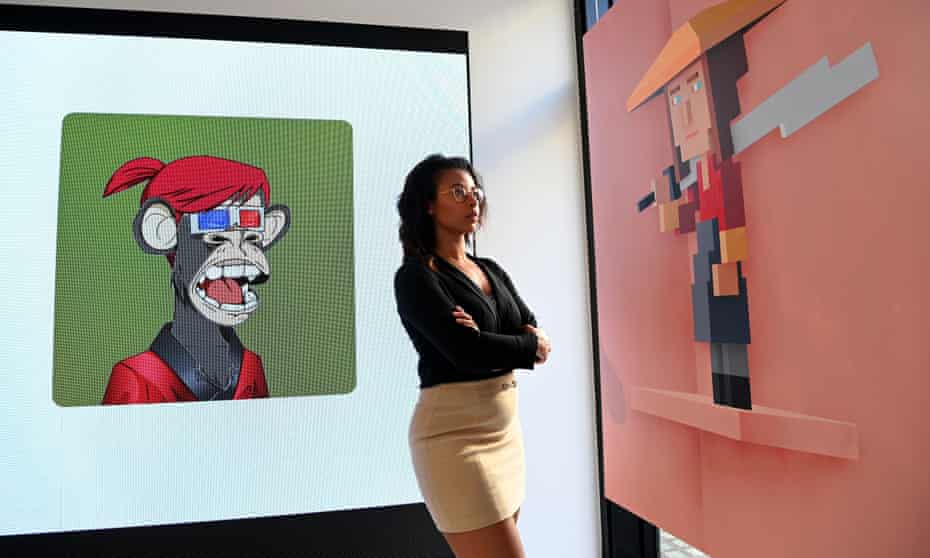17/12/2021 NFTs market hits $22bn as craze turns digital images into assets
Critics of non-fungible tokens say they are symptomatic of unsustainable digital gold rush

The global market for non-fungible tokens hit $22bn (£16.5bn) this year as the craze for collections such as Bored Ape Yacht Club and Matrix avatars turned digital images into major investment assets.
NFTs have drawn from veteran investors similar warnings to those issued about cryptocurrencies: that they are symptomatic of an unsustainable, digital gold rush. NFTs confer ownership of a unique digital item – whether apiece of virtual artby Damien Hirst or a jacket to be worn in the metaverse – upon someone, even if that item can be easily copied. Ownership is recorded on a digital, decentralised ledger known as a blockchain.
Data from DappRadar, a firm that tracks sales, showed that trading in NFTs reached $22bn in 2021, compared with just $100m in 2020, and that the floor market cap of the top 100 NFTs ever issued – a measure of their collective value – was $16.7bn.
The most valuable NFT sale this year wasThe First 5000 Days, a digital collage by Beeple, the name used by the American digital artist Mike Winkelmann, that was auctioned for $69.3m in March, making it one of the most valuable pieces of art ever sold by a living artist. Another Beeple NFT,Human One, sold for $29m.
Other multimillion-dollar NFTs included theBored Ape Yacht Club, a collection of 10,000 NFTs represented as cartoon primates that are used as profile photos on the social media accounts of their owners and which raised $26.2m. Celebrity BAYC owners include the talkshow host Jimmy Fallon and the rapper Post Malone.
DappRadar said a key factor in the surge in NFT trading was mainstream businesses entering the fray.
Coca-Cola raised more than $575,000 from selling items such as a customised jacket to be worn in the metaverse world of Decentraland while the Matrix star Keanu Reevesfailed to keep a straight facewhen told by an interviewer that hisMatrix film seriesnow had NFTs attached to it.
“Hollywood, sports celebrities and big brands like Coca-Cola, Gucci, Nike, and Adidas, made their dent in the space, providing NFTs with a new level of exclusivity. The power of attraction of these famous names profoundly impacted NFTs and the blockchain industry overall,” said DappRadar.
Football fans have been targeted with NFT marketing – including with NFTs backed by the former England players John Terry and Wayne Rooney – and have been warned by experts that they are risky assets, unregulated in the UK. It will take years before NFTs behave like a conventional market, said George Monaghan, analyst at research firm GlobalData.
“2021 NFT activity was frenzied. That’ll subside in coming years and NFTs will settle into something more akin to today’s modern art market, where consensus on value is more solid. That said, it’ll be years before any crypto market, let alone NFTs, comes to resemble anything conventional markets would call stable. I wouldn’t throw your rainy day fund into any meme NFTs quite yet,” he said.
As we approach the end of the year in Russia, we have a small favour to ask. We’d like to thank you for putting your trust in our journalism this year - and invite you to join the million-plus people in 180 countries who have recently taken the step to support us financially, keeping us open to all, and fiercely independent.
In 2021, this support sustained investigative work into offshore wealth, spyware, sexual harassment, labour abuse, environmental plunder, crony coronavirus contracts, and Big Tech.
The new year, like all new years, will hopefully herald a fresh sense of cautious optimism, and there is certainly much for us to focus on in 2022 - a volley of elections, myriad economic challenges, the next round in the struggle against the pandemic and a World Cup.
With no shareholders or billionaire owner, we can set our own agenda and provide trustworthy journalism that’s free from commercial and political influence, offering a counterweight to the spread of misinformation. When it’s never mattered more, we can investigate and challenge without fear or favour.
Unlike many other media organisations, Guardian journalism is available for everyone to read, regardless of what they can afford to pay. We do this because we believe in information equality. Greater numbers of people can keep track of global events, understand their impact on people and communities, and become inspired to take meaningful action.
 (0)
(0)
 (0)
(0)